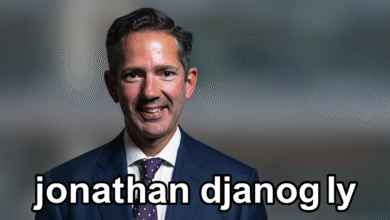Gareth Jones: The Brave Journalist Who Exposed the Hidden Truth of the Soviet Famine
A fearless Welsh reporter whose courage changed the course of history

Table of Contents
ToggleIntroduction
Gareth Jones remains one of the most remarkable figures in the history of investigative journalism. Known for his honesty, integrity, and fearless pursuit of truth, Jones risked his life to reveal the reality of the Soviet famine in 1933, a tragedy now known as the Holodomor. His story is not just about one man’s bravery—it’s about the power of truth against propaganda and silence.
Jones’s reports, based on his direct observations across Soviet Ukraine, contradicted the official narrative and challenged some of the most influential journalists of his time. Despite facing denial, censorship, and ultimately losing his life, his words have endured as a testament to journalistic courage. His legacy continues to inspire truth-seekers, journalists, and historians around the world.
Quick Bio
| Full Name | Gareth Richard Vaughan Jones |
|---|---|
| Born | 13 August 1905, Barry, Glamorgan, Wales |
| Died | 12 August 1935, Inner Mongolia, China |
| Nationality | British (Welsh) |
| Ethnicity | Welsh |
| Profession | Journalist, Foreign Affairs Adviser |
| Education | University College of Wales, Aberystwyth; University of Strasbourg; Trinity College, Cambridge |
| Parents | Edgar William Jones (father), Ann Gwenllian Jones (mother) |
| Known For | Exposing the Soviet famine (Holodomor) |
| Languages | Welsh, English, French, German, Russian |
| Age at Death | 29 |
Early Life and Family Background
Gareth Jones was born on 13 August 1905 in Barry, Glamorgan, Wales, into an educated and culturally rich Welsh family. His father, Edgar William Jones, was a respected headmaster, and his mother, Ann Gwenllian Jones, nurtured in him a love of learning and curiosity about the wider world. Jones grew up in a disciplined yet supportive environment, which shaped his values of honesty and hard work.
From a young age, Gareth showed remarkable intelligence and linguistic ability. His home life encouraged academic excellence and cultural awareness. The strong moral foundation instilled by his parents would later become the driving force behind his unshakable commitment to truth. He was deeply proud of his Welsh heritage, which remained an essential part of his identity throughout his life.
Education and Academic Excellence
Jones’s education was exceptional and reflected his dedication to intellectual growth. He first attended Barry County School, where his father was headmaster. After excelling in his studies, he went on to the University College of Wales, Aberystwyth, earning a first-class honours degree in French in 1926.
Eager to expand his knowledge, Gareth studied at the University of Strasbourg before joining Trinity College, Cambridge. There, he graduated with another first-class degree in French, German, and Russian in 1929. His academic achievements established him as a brilliant linguist and scholar. Fluent in five languages, Jones would later use this gift to communicate with people across Europe and Asia, uncovering stories hidden by governments and censorship.
The Start of a Journalist’s Journey
After completing his studies, Gareth Jones briefly taught languages at Cambridge University before entering the world of journalism. In 1930, he was appointed as a Foreign Affairs Adviser to former British Prime Minister David Lloyd George. This position gave him access to international politics and allowed him to travel widely, observing the changing political climate of the early 20th century.
Jones quickly developed a passion for field reporting. His curiosity led him to explore the realities of life in countries under totalitarian regimes. Unlike many journalists of his time, he believed in firsthand observation rather than relying on government statements. This commitment to factual reporting would become the cornerstone of his career—and the reason for his fame and controversy.
Exposing the Soviet Famine
In 1933, Gareth Jones made a dangerous journey into the Soviet Union to investigate rumours of food shortages. Against official restrictions, he travelled on foot through villages in Ukraine, witnessing the horrors of starvation. He met peasants who told him, “There is no bread—we are dying.”
On 29 March 1933, Jones held a press conference in Berlin, announcing to the world that millions were starving in the Soviet Union. His report directly contradicted official Soviet claims and challenged foreign journalists who had downplayed or denied the famine. This act of bravery brought him both fame and hostility. He was banned from the Soviet Union soon after.
Despite the risks, Jones refused to remain silent. His truth-telling exposed the devastating effects of government-controlled misinformation. His courage to speak when others stayed quiet remains one of the most powerful examples of journalistic integrity in modern history.
Later Travels and Tragic Death
After being banned from the Soviet Union, Gareth Jones continued his international reporting. In 1934, he embarked on a world tour, visiting Japan, China, and Inner Mongolia to document rising political tensions in Asia. His goal was to shed light on emerging powers and global instability.
In August 1935, while traveling through Inner Mongolia with a fellow journalist, Herbert Müller, Jones was kidnapped by local bandits. Despite ransom negotiations, he was murdered on 12 August 1935—just one day before his 30th birthday. His death shocked the world, and some suspected that political forces sought to silence him. Though the full truth behind his murder remains uncertain, his sacrifice marked the end of a life devoted to honesty and courage.
Legacy of a Courageous Journalist
Gareth Jones’s legacy is one of truth and bravery. He became the first Western journalist to uncover the full scale of the Holodomor, the man-made famine that killed millions in Ukraine. His determination to reveal the facts, even in the face of opposition, made him a symbol of journalistic integrity.
Today, his memory is honoured in both Wales and Ukraine. Memorials and plaques stand in his hometown of Barry and at Aberystwyth University. In 2008, he was posthumously awarded the Ukrainian Order of Merit. His life was also portrayed in the 2019 film Mr Jones, which brought renewed attention to his extraordinary story. His work continues to inspire journalists worldwide to pursue truth without fear or favour.
Conclusion
Gareth Jones’s life was short, but his impact was eternal. His fearless reporting changed how the world viewed the Soviet regime and highlighted the importance of independent journalism. He proved that one voice, guided by truth, can stand against the most powerful lies.
Through his dedication, sacrifice, and moral strength, Gareth Jones remains a beacon of journalistic courage. His story teaches future generations that honesty, even in danger, is the most powerful weapon against injustice. The name Gareth Jones will forever stand for truth, humanity, and the unbreakable spirit of a journalist who refused to be silenced.
Frequently Asked Questions (FAQ)
Q1: Who was Gareth Jones?
Gareth Jones was a Welsh journalist and foreign affairs adviser known for exposing the Soviet famine of 1932–1933, known as the Holodomor.
Q2: What was Gareth Jones’s nationality?
He was British, with Welsh ethnicity and heritage.
Q3: What is Gareth Jones best known for?
He is best known for revealing the truth about the famine in Soviet Ukraine in 1933, when millions died of starvation.
Q4: How did Gareth Jones die?
He was kidnapped and murdered in Inner Mongolia, China, in August 1935 while on a reporting assignment.
Q5: Why is Gareth Jones considered important today?
He is celebrated for his integrity and courage as a journalist who risked his life to uncover hidden truths, inspiring generations of reporters worldwide.
Q6: What languages did Gareth Jones speak?
He was fluent in Welsh, English, French, German, and Russian, which helped him report internationally with accuracy and insight.
Q7: What is Gareth Jones’s lasting legacy?
His reports on the Holodomor remain some of the earliest and most truthful accounts of the tragedy, earning him posthumous recognition as one of history’s most honest journalists.




